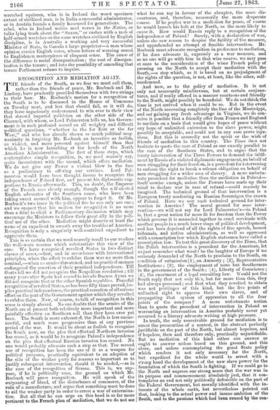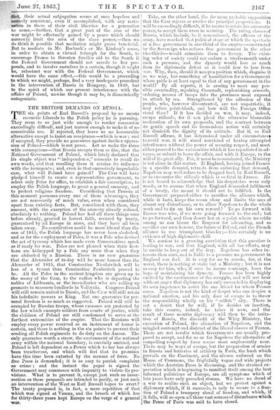RECOGNITION AND MEDIATION AG .1 IN.
aE friends of the South, as we fear we must call them, rather than the friends of peace, Mr. Roebuck and Mr. Lindsay, have prudently provided themselves with two strings to their bow. Mr. Roebuck's motion for a recognition of the South is to be discussed in the House of r'Commons on Tuesday next, and lest that should fail, as it will do, they have sagaciously endeavoured to win over to their view that shrewd imperial politician on the other side of the Channel, with whom, as Lord Palmerston tells us, his Govern- ment is in such profound accord on all weighty and difficult political questions, " whether in the far East or the far
West," and who has already shown so much political mag- nanimity in forgiving Mr. Roebuck an invective as foolish, as violent, and more personal against himself than that which he is now launching at the heads of the North American Administration. The first of these steps, which contemplates simple recognition, is, we need scarcely say, quite inconsistent with the second, which offers mediation. We do not give any Power a violent blow in the face as a preliminary to offering our services. Lord Pal- merston would have been thought insane to recognize the independence of Poland first, and present his diplomatic sug- gestions to Russia afterwards. This, no doubt, the Emperor of the French sees clearly enough, though the self-elected English advocates of the Southern cause, who have been
taking sweet counsel with him, appear to forget it. Of Mr. Roebuck's two irons in the political fire he can only use one ; and we suspect that his motion for recognition is no more
than a feint to elicit a Parliamentary discussion which may encourage the Ministers to follow their great ally in the poli- tical use of the other. Mediation might deserve at least the
name of an expedient to smooth away the troubles of America. Recognition is only a singu!arly well-contrived expedient to aggravate them.
This is so certain that we need scarcely recall to our readers the well-worn reasons which substantiate this view of the case. We have recognized revolted States in two distinct classes of cases,—first, and in accordance with international principles, when the effort to subdue them was no more than nominal,—when no armies threatened, and no practical menace endangered the assertion of their practical independence. Till Gaeta fell we did not recognize the Neapolitan revolution ; till many years after Spain had ceased to invade Buenos Ayres we did not recognize that or the other Spanish republics. Peaceful recognition of revolted States, as has been fifty times proved, im- plies practical independence, the practical cessation of all serious effort on the part of the Government against which they revolted. to subdue them. Now, of course, to talk of recognition in this sense is simply absurd. No one doubts that the armies of the North are at present both relatively more important and more painfully effective on Southern soil than they have ever yet been. The South is more exhausted, the North is less unsuc- cessful, and much more progressive than at any previous period of the war. It would be about as foolish to recognize the South now, on the plea that effectual Northern invasion has ceased, as it would be to recognize Poland's independence on the plea that effectual Russian invasion has ceased. No one would probably advocate such a step as that. The second use of recognition has been the use of it as a weapon for political purposes, practically equivalent to an adoption of the side of the weaker party for reasons so important as to justify subsequent intervention, should it be needed,—as in the case of the recognition of Greece. This is, we sup- pose, if he is politically sane, the ground on which Mr.
Roebuck will press recognition. He will speak of the outpouring of blood, of the disturbance of commerce, of the
ruin of a manufacture, and argue that something must be done to aid the weaker party in order to arrest a war of extermina- tion. But all that he can urge on this head is so far more pertinent to the French plan of mediation, that we do not see what he can say in favour of the abrupter, the more dis- courteous, and, therefore, necessarily the more desperate
course. If he prefers war to a mediation for peace, of courte he would launch his bolt at the North, as the more likely to cause it. How would Russia reply to a recognition of the independence of Poland ? Surely, with a declaration of war, unless she saw reason to despise the futility of the measure, and apprehended no attempt at forcible intervention. Mr. Roebuck must advocate recognition in preference to mediation,
if he does advocate it, expressly as a war measure, and as no one will go with him in that wise course, we may pass
at once to the consideration of the wiser French policy of pressing on the North to accept their mediation with the South,—a step which, as it is based on no prejudgment of the rights of the question, is not, at least, like the other, self- condemned.
And now, as to the policy of mediation. It is not only not necessarily mischievous, but at certain conjunc- tures, and if really offered in a manner courteous and friendly to the North, might possibly be beneficial. We do not think, the time is yet arrived when it could be so. But in the event of the North recovering completely the line of the Mississippi, and not gaining any fresh advantage in Virginia, we do con- ceive it possible that a friendly offer from France and England to mediate on a basis that would give hopes of peace without any hope of unlimited extension to the slave power, might possibly be acceptable, and could not in any case prove inju- rious. But this is assuredly not the spirit or the wish of friends of mediation in this country. The Times does not hesitate to quote the case of Poland as one exactly parallel to the case of the Southern States, and to argue that the treaty intervention of the Three Powers to demand the fulfil- ment byRussia of a violated diplomatic engagement, on behalf of men struggling for their freedom, is a precedent for intervening to enforce the right to break a solemn obligation on behalf of men struggling for a wider area of slavery. A more unfortu- nate precedent for mediation than the mediation in Poland— itself unwise enough, unless the Powers have made up their mind to declare war in case of refusal—could scarcely be imagined. The technical ground of that intervention is a European treaty conferring on Russian Sovereigns the crown of Poland. Have we any such technical ground for inter- vention in America ? The moral ground for some inter- vention—we will not say for Lord Palmerston's—in Poland is, that a great nation far more fit for freedom than the Power which governs it is manacled together in cruel servitude with another people in a much lower stage of political development, and has been deprived of all the rights of free speech, honest tribunals, and native administration, as well as oppressed with a conscription law which English statesmen have called a proscription law. To test this great discovery of the Times, that the Polish intervention is a precedent for the American, let usjust remember what would be the laughter of Europe if we seriously demanded of the North to proclaim to the South, on condition of submission (1), an Amnesty ; (2), Representative Institutions ; (3), the employment of none but Southerners in the government of the South; (4), Liberty of Conscience ; (5), the enactment of a legal recruiting law. Would not the South reply that not only this, but far more than this, they had always possessed ; and that what they revolted to obtain was not privileges of this kind, but the five points of unlimited right to oppress their own slaves, and of propagating that system of oppression to all the four points of the compass ? A more unfortunate notion than to quote the precedent of intervention in Poland as warranting an intervention in America probably never yet occurred to a literary advocate writing at high pressure. In truth, the only conceivable ground for mediation is to arrest the prosecution of a contest, in the abstract perfectly justifiable on the part of the North, but almost hopeless, and if hopeless, then and therefore only, practically unjustifiable. But no mediation of this kind either can answer or ought to answer unless based on this ground, and this alone, and unless contemplating the great State policy which renders it not only necessary for the North, but expedient for the whole world to arrest with a strong hand the development of the new slave power for the foundation of which the South is fighting. If we could go to the North and express our strong sense that the war was in its purpose and commencement absolutely just, that it con- templates an end not only politically defensible on the part of the Federal Government, but morally identified with the in- terests of the whole earth, but nevertheless pointed out that, looking to the actual power and insane ambition of the South, and to the passions which had been roused by the eon- *et, their actual subjugation seems at once hopeless and scarcely consistent, even if accomplished, with any resto- Pation to them of their civil liberties for a generation to come,—further, that a great part of the aim of the Isar might be effectually gained by a peace which should narrowly limit the area of the slave power,—then we do think it possible that mediation might prove beneficial. But to mediate in Mr. Roebuck's or Mr. Lindsay's sense, in order to obtain a virtual triumph for the South, to encourage France to threaten forcible aid to the South if the Federal Government should not accede to her pro- posals, and to involve ourselves in a certain, though it might be, reluctant war with the Federal Government, which would have the same effect,—this would be a proceeding to which we might, perhaps, find a very inadequate precedent in the intervention of Russia in Hungary, in 1849, but to the spirit of which our present interference with the affairs of Poland, unwise though it may be, is diametrically antagonistic.































 Previous page
Previous page